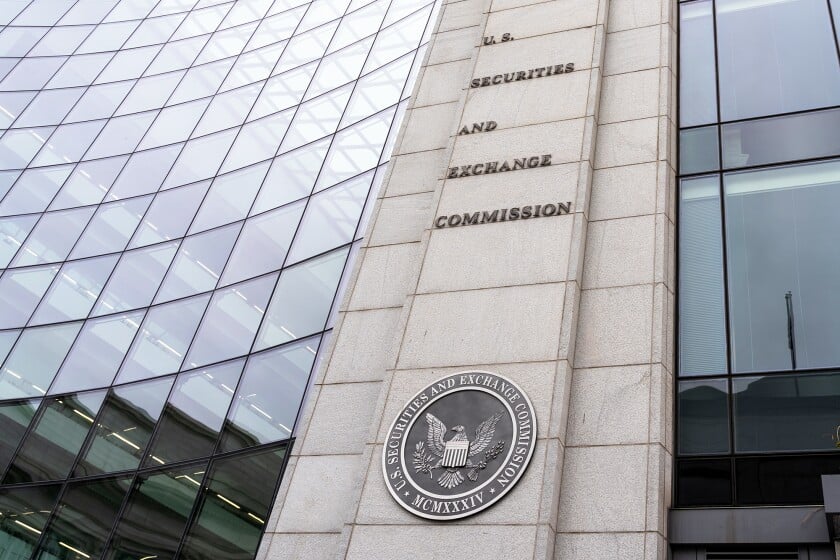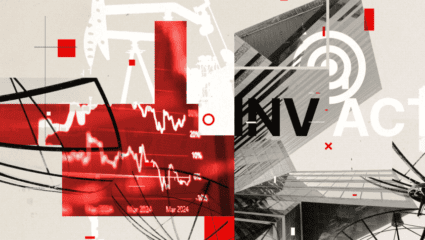
In September, over GOP objections, the Securities and Exchange Commission introduced a proposal seeking to improve disclosures for institutional investors voting on mergers, director candidates, ESG-focused shareholder proposals and other topics.
Buried inside the 174-page package, which needs approval by commissioners, is a provision seeking to put a spotlight on the opaque multibillion-dollar industry of share lending by institutional investors.
The provision requires institutional investors to disclose annually the number of shares they voted as well as how many shares they loaned.
The new lending measure could have far-reaching consequences and potentially upend short seller activists who borrow shares and seek to convince investors to sell their shares, driving the price of a given stock down. At the same time, it could lead to a substantial uptick in voting by the likes of BlackRock Inc. (BLK), State Street Corp. (STT) and Vanguard Group Inc. on high-profile ESG matters.
Among its chief affects would be to convince institutions to scale back share-lending programs given the potential for a PR crisis over investor concerns that they aren’t voting shares on critical ESG topics. Investors need to own shares ahead of corporate record dates, so they can vote them on topics at subsequent annual meetings.
“Index funds always say they vote because it’s their fiduciary duty and they add that their vote is material to the three- to five-year ark of these companies,” one ex-index fund employee said. “Then why do you have 20% of the name on loan on the record date?”
Georgetown University finance professor Reena Aggarwal said institutions could be pressured by investors to scale back lending.
“It’s a shaming game,” she said. “Otherwise investors will respond and say, ‘You’re not meeting your fiduciary duty by lending out shares and not voting.’”
Increased transparency could be especially embarrassing for large institutional investors if the disclosure shows only the number of shares lent out, without putting it in the context of each fund’s total position in a company, Aggarwal said.
If they don’t disclose, NGOs and, perhaps, sustainability-focused investors could call them out. Currently, large funds lend out lots of shares in big, well-known tech companies, which increasingly are targeted by activist shareholders proposals related to CEO pay, human rights, governance, antitrust and competition, the ex-investor said.
“Having to make share lending public would lead to questions like, ‘Why didn’t you vote shares at Facebook, Twitter or Microsoft?’” the person said of the widely held tech names.
The Downsides to Recalls
Beyond more accountability for institutions, Aggarwal noted that changes in disclosures could lead to a larger effort to recall shares just in advance of company record dates, which may cause problems for the fund managers and activist short sellers alike.
“Investors will say, ‘I don’t want to be called out for this,’” Aggarwal said. “If they recall they don’t have to worry about what signals the fund is sending to the market by not recalling.”
However, a big push to recall shares could make it much more difficult for hedge funds or activists to borrow stock for short selling. “Borrowing costs will go up because supply will go down,” she said.
But increased recalls could force the investors to go elsewhere to borrow shares and could eat into the sizable revenue stream for index fund managers. Some lenders such as hedge funds, for instance, don’t fall under the disclosure rules.
“A market where lenders recall shares ahead of record dates would put pressure on short sellers closer to record dates,” said Boston College finance professor Vyacheslav Fos. “It is therefore natural to expect that short sellers will prefer to borrow shares from lenders who are less likely to recall shares.”
The ex-index fund employee said big index investors almost never recall shares in time to vote ahead of key meetings, for fear that such a move would push market participants to seek out other lenders.
Where There’s a Profit There’s a Way
Even still, share-lending is big business for index fund managers and it’s unlikely these firms would stop the practice altogether.
Currently, for instance, some institutional investors are recalling lent shares just in advance of record dates so they can vote and then re-lending them out soon after, Aggarwal said. This practice could increase if the disclosure rule is adopted.
“They slow down lending about two weeks before the record date, and immediately after it passes, they lend again,” she said, adding research shows that securities lending already drops in the two weeks before the record date.
“Lending desks ask investors to give them two weeks’ notice before recalling shares, particularly when contentious issues are on the ballot,” she said.
For now, share lending is a significant profit line for institutions, particularly the big three index fund managers. According to the SEC, funds filing on Form N-CEN, a report filed by registered investment companies, reported net income of $2.7 billion from lending in their most recent fiscal year.
BlackRock noted in October that it generated $152 million in securities lending revenue in the third quarter, up from $140 million in the second. Overall, the fund generates about $500 million in revenue annually from securities lending.
State Street, meanwhile, generated $106 million in securities lending fee revenue in the third quarter and $109 million in the second quarter. It produced $356 million in securities lending revenue in 2020.
Industry insiders insist that share lending is a very lean business, with few costs. As a result, expect big index fund managers to do everything in their power to keep lending even in a world where transparency tries discourage the practice. At the same time, activist short sellers may need to scale back activities or seek out new, possibly more expensive lenders.
Editor’s note: The original version of this article was published earlier on The Deal’s premium subscription website. For access, log in to TheDeal.com or use the form below to request a free trial.



